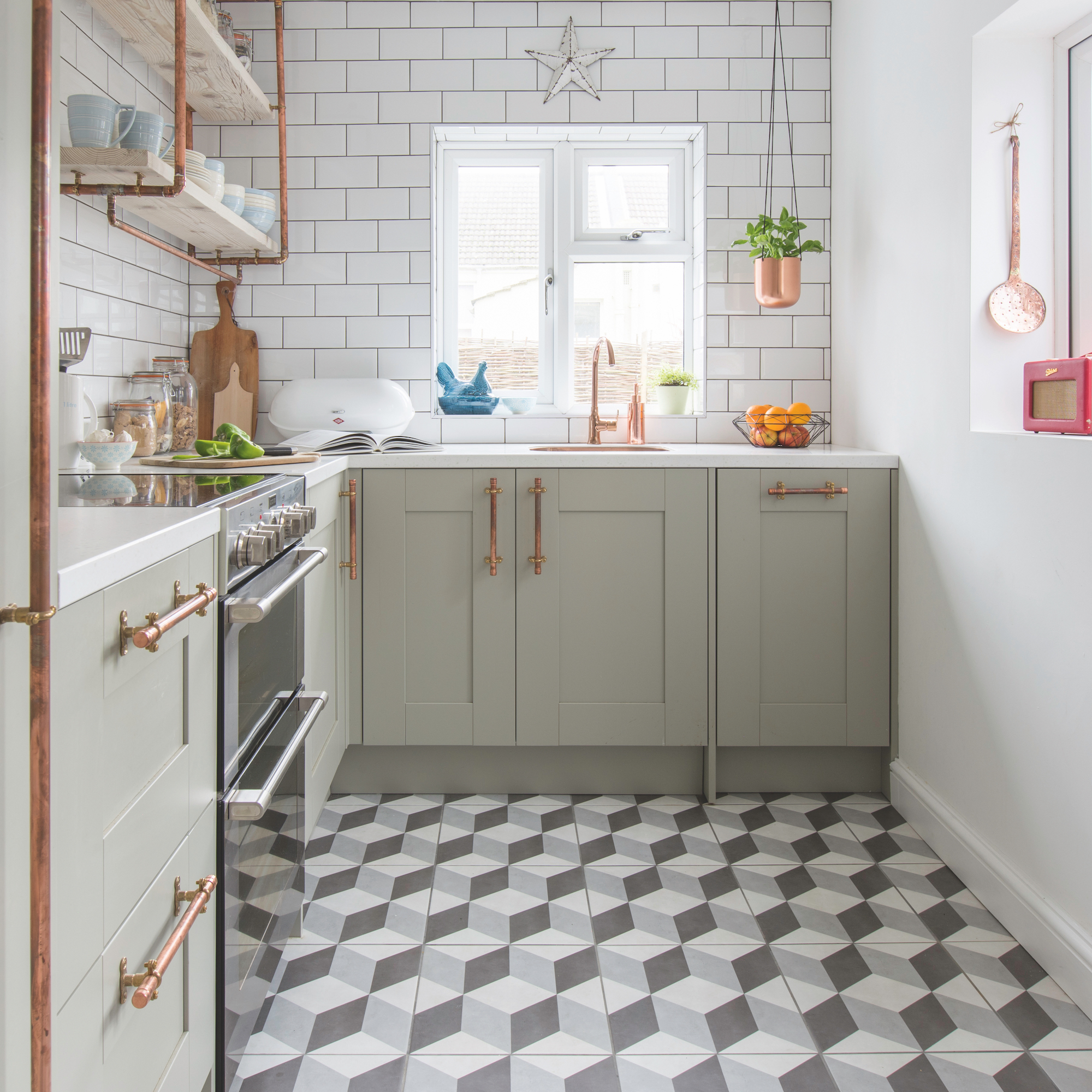
The kitchen floor is one of the surfaces of our homes that needs to be tough and resilient. If you've recently moved into a new home or your flooring looks a little worse for wear you might be wondering how much kitchen flooring costs to replace it.
When it comes to kitchen flooring ideas you want to make sure it's hard-wearing as well as aesthetically pleasing, so we've spoken to a range of experts to find out what you can expect to pay and the features that will affect the cost.
'Different kitchen flooring options vary in prices,' explains Phil Probert, head of flooring at B&Q. 'Laminate flooring averages at around £15sq m, tiles average at £25sq m and natural flooring costs starts at around £42sq m for the most basic option, with average prices ranging from £70 to £80sq m.'
As well as cost, there are a few other things to factor in when choosing your kitchen flooring. 'It's important to prioritise a practical, reliable option that can withstand spills and stains,' advises Molly Woodward-Moor, interior designer, and creative director at Stone Superstore. 'As well as ensuring it looks the part, the best kitchen flooring should be durable, easy to clean and resistant to moisture, to offer peace of mind.'
How much does kitchen flooring cost by material?
To help you decide which type of flooring is best for you, we've done a breakdown of some of the most popular materials so you can see how much different kitchen flooring materials cost.
LVT (Luxury vinyl tiles)
LVT (Luxury Vinyl Tiles) is a popular choice when it comes to kitchen flooring as it can be waterproof and is more hard wearing than other materials.
'Luxury Vinyl Tiles average approximately £20-£50sq m,' explains Molly. 'They are a versatile and durable flooring option that can replicate the appearance of wood, stone, or tiles at a lower cost and with easy installation.'
Stone
If you would like stone flooring in your kitchen, the prices can fluctuate as there are so many different types and quality.
'Natural stone tiles can vary between £35sq m to upwards of £100sq m+ depending on the material,' explains Isabel Fernandez from Quorn Stone. 'Marble and French limestone is within the higher price range, whereas limestone tiles are a popular choice for kitchen flooring and usually average around £50-£60sq m.'
As well as the cost of stone, consider whether you will have the time to maintain it on a regular basis.
'There are many different types of natural stone, with each having their own unique characteristics, but all require sealing and on-going maintenance to keep them fully protected,' adds Molly.
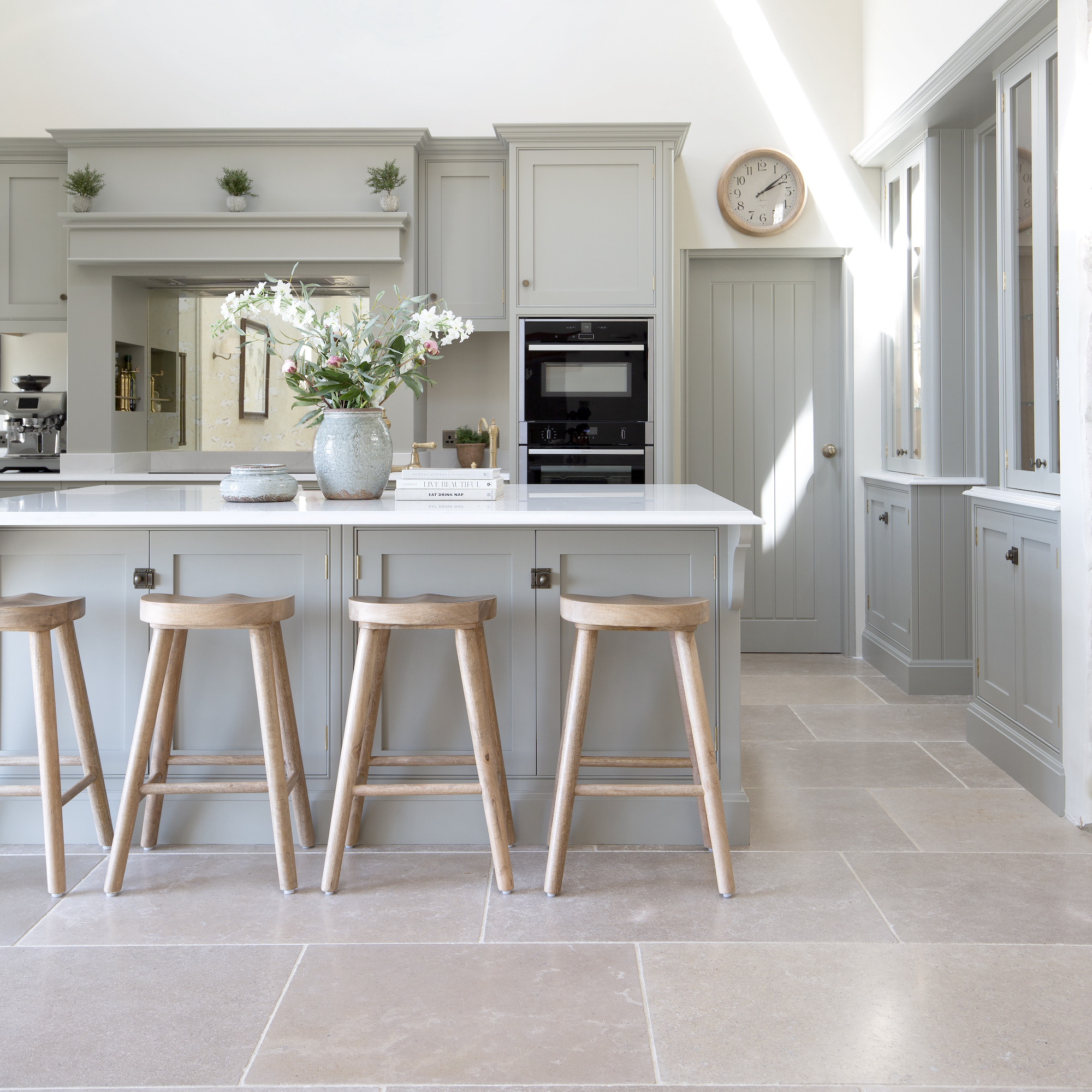
Porcelain tiles
Opting for porcelain tiles gives you a wide choice when it comes to design as you can find everything from terrazzo, stone, wood and marble effect, so you can have the look of a luxury material but in a more durable finish.
'Porcelain tiles range from £20-£80sq m,' explains Molly. 'They are one of the most popular flooring choices for kitchens due to their durability and ease of cleaning, being able to withstand spills, stains, and scuffs.'
Laminate
Laminate is a popular material as it's one of the more budget-friendly options you can use for kitchen flooring.
'The cost of laying laminate flooring varies based on several factors,' explains Johanna Constantinou, flooring expert at Tapi Carpets & Floors. 'Including room size, laminate type, underlay type, and chosen accessories. At Tapi, we offer a wide range of laminate flooring options to suit every budget. Our cheapest laminate is priced at £21.99sq m, and the most affordable underlay is £7.99sq m.'
Vinyl
Coming in at as one of the most affordable kitchen flooring options, vinyl is good choice if you want a budget-friendly update. 'One advantage of vinyl is that it doesn't require an underlay, as it already has a built-in spongy layer that makes it soft underfoot,' explains Johanna. 'Our cheapest vinyl is £19.99sq m.'
Neel Bradham, CEO at global flooring brand, Parador also thinks vinyl makes a good kitchen flooring choice thanks to its versatility. 'It's known for its resistance to moisture and climate, making it great for the kitchen. It provides the patterns, colours, and textures of wood while being suitable for areas that may often endure excess moisture and spills.'

Engineered Wood
Engineered wood is a popular choice for kitchen flooring, especially if you're after a more traditional, cosy feel, but the costs can vary greatly.
'Depending on the quality of the product you select, engineered wood flooring can cost anywhere between £40sq m to upwards of £250sq m for supply and fit,' explains Ian Tomlinson, MD, Chaunceys Timber Flooring. 'More bespoke wood flooring options such as additional textures and more complex, tailored colours will add extra costs.'
What is the most affordable kitchen flooring to install?
Overall it's hard to see a cheaper kitchen flooring than vinyl flooring, making it one of the most sought-after choices for those on a budget.
'Vinyl is the most affordable kitchen flooring to install due to its cost-effectiveness, ease of installation, and minimal maintenance requirements,' explains Johanna. 'Priced competitively, vinyl often starts at around £19.99sq m, making it accessible for budget-conscious homeowners.'
'Unlike other flooring types, vinyl doesn't require an underlay, reducing both material and labour costs, plus its simple installation process allows for DIY projects, further cutting expenses,' she adds.
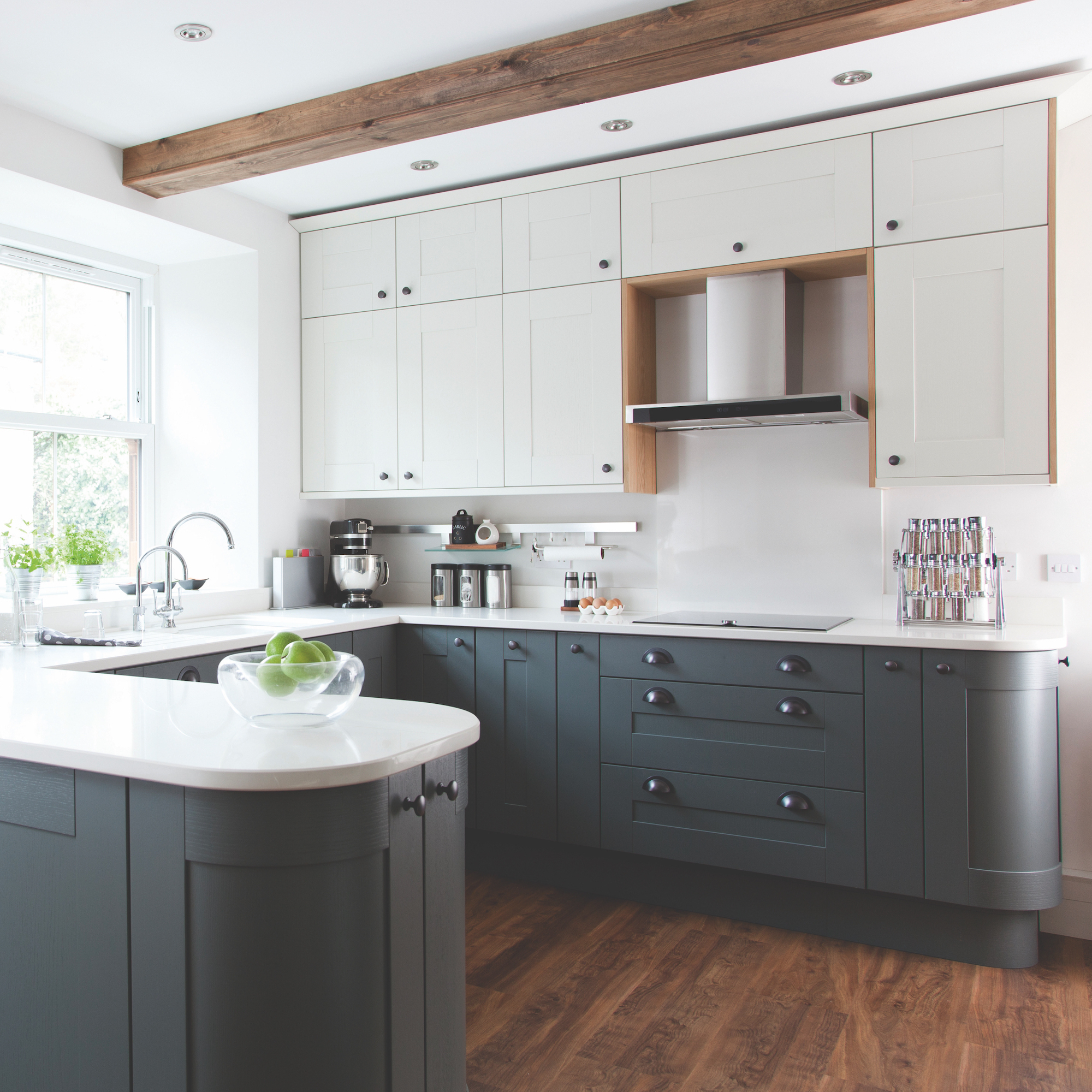
What is the most expensive kitchen flooring to install?
Natural materials like wood or stone tend to be the most expensive and also the most high maintenance as they often need sealing or refinishing on a regular basis.
'Engineered hardwood flooring and natural stone tiles will generally be a more expensive kitchen flooring option, but the quality and beauty of these durable, natural materials will make a huge impact to the aesthetic of a kitchen and are worth the investment,' explains Ian.
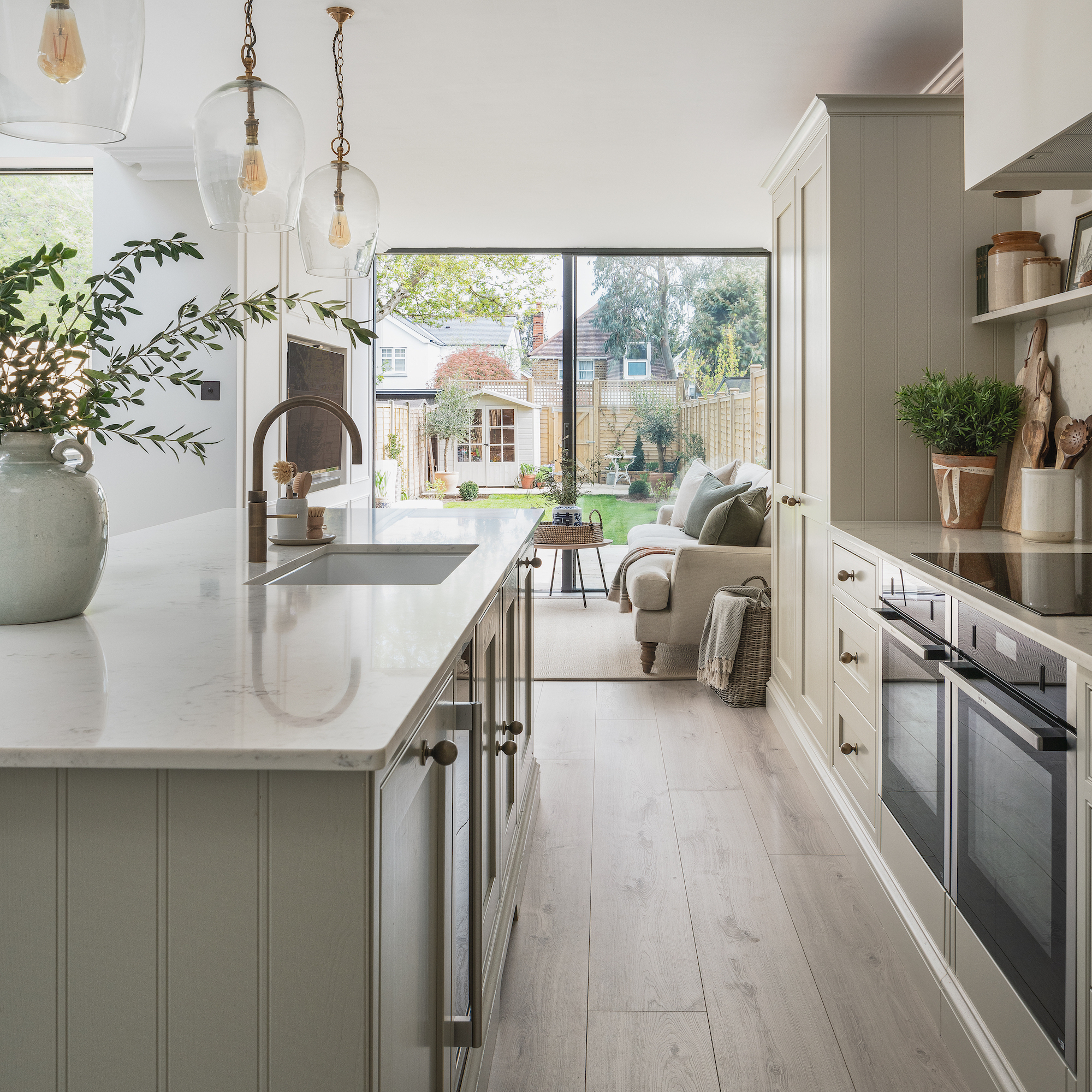
How much does it cost for kitchen flooring to be fitted?
The cost of fitting often depends on the complexity of the job, so bear in mind if you want your kitchen floor laid in a particular design it can be more expensive as it's a more time consuming process.
'Labour costs can greatly range from £15 to £200sq m, depending on the complexity of the job and the material you’re working with,' explains Molly. 'Some installers may charge a day rate, typically between £150 and £350, however prices can vary significantly based on location, specific project details, and installer rates. It's always advisable to get multiple quotes from local flooring specialists to get a more accurate estimate for your specific needs.'
What additional costs do you need to factor in?
You will also need to factor in the cost of things like underlay, the layout of your flooring (choosing a more complex design will take longer to fit) and whether your subfloor needs any work too.
Uneven floors
One of the key things to check before laying any floor, is that the surface is level and in good condition.
'If the floor is uneven, it may require levelling of the subfloor,' explains Natalie Mudd, co-founder and creative director at Knot & Grain. 'This task shouldn’t be skipped as most floors require a perfectly level and smooth subfloor to increase the longevity and avoid any cracks.'
Layout of flooring
If using wooden flooring, the style you want it laid can impact the overall cost.
'The additional flooring required for a zig-zag style such as herringbone is more square meterage than other styles,' explains Natalie. 'The intricate pattern involves placing rectangular planks to create the design, which requires precise cuts and careful planning. It can lead to leftover material, while the lengthier instalment can also increase labour time.'
So, if you like the idea of wooden flooring but want to reduce the cost, consider a straight flooring pattern rather than a more intricate design.
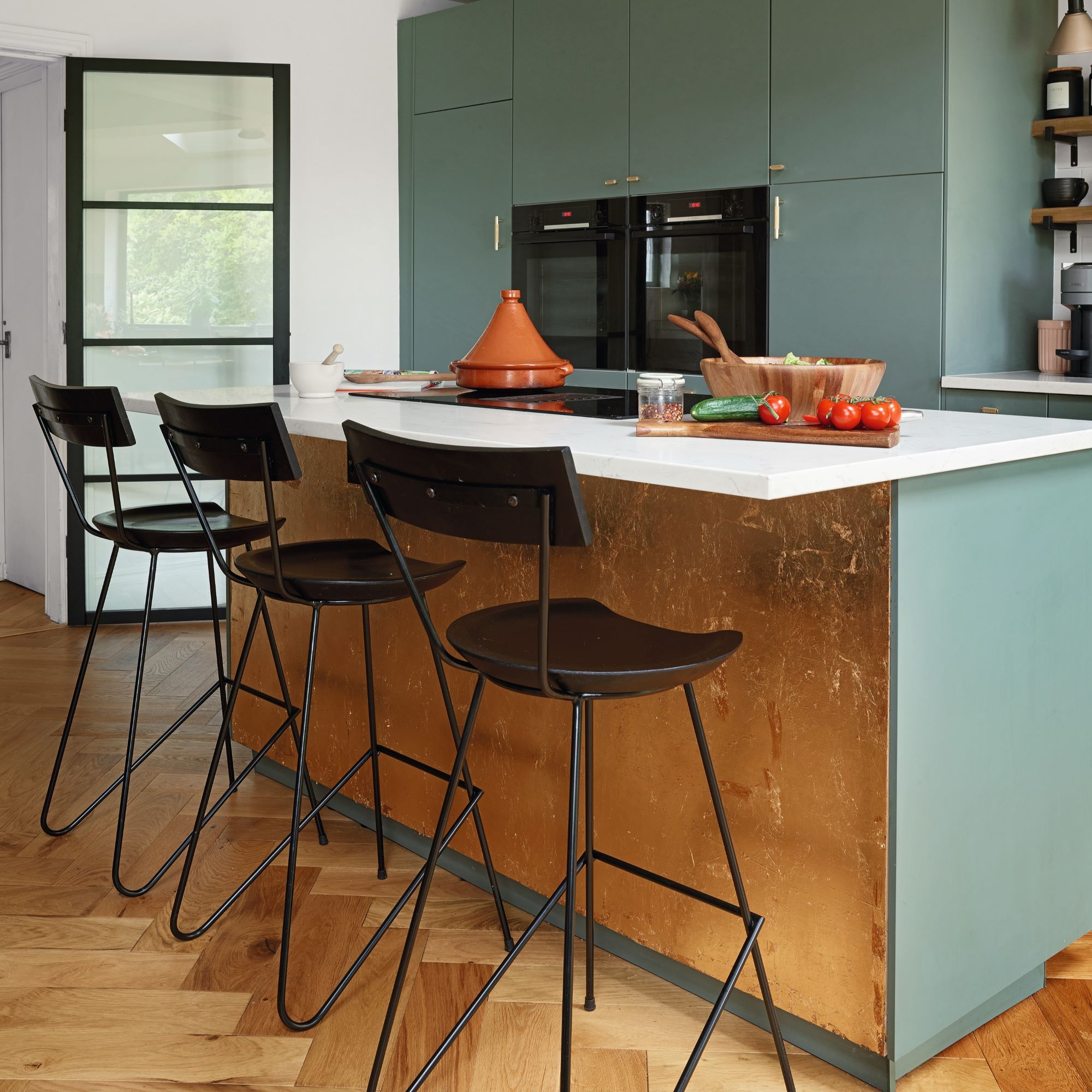
Extra materials
As well as the flooring, you'll have to budget for fixing materials too, especially when using tiles. Tile adhesive and grout can add up when you have to use it over a large area. Also, discuss with your flooring supplier if there is a delivery charge.
'You may also need to consider delivery cost if needing to cover a large area of flooring. Natural stone and porcelain floor tiles are classed as heavy goods and are usually packed and delivered in crates or pallets, so it is worth factoring in delivery costs into your budget,' explains Isabel.
FAQs
What is the best floor to put in a kitchen?
'In my opinion, durable and water-resistant options are the way to go,' advises Yarl Christie, founder & CEO of Stories Flooring. 'I believe luxury vinyl tiles (LVT) and ceramic tiles offer the best value for money, being easy to clean and maintain in a busy area. For a cost-effective option that prioritises style and longevity within a budget-friendly range, I would go for laminate flooring.'
What is the cheapest way to get a new kitchen floor?
'The cheapest way to get a new kitchen floor involves making small, informed choices from choosing cost-effective materials to completing your own installation,' advises Molly. 'If you’re looking for a low-cost option and are fairly flexible with your preferences, be sure to look into seasonal sales and clearance sections where you can often find great savings on premium, end-of-line products.'
Before you take the plunge, take your time to crunch the numbers and decide what your space needs. That is the best way to ensure you're making the best investment for your home.







